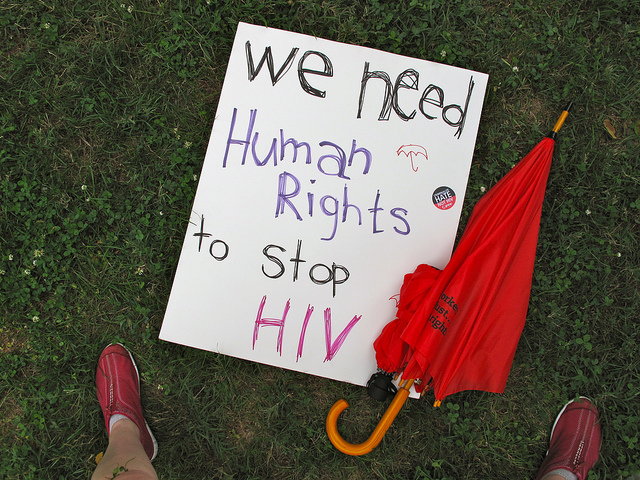This month’s Justice Committee hearings concerning Bill C-36, the Conservative government’s proposed sex work legislation, missed a critical mark. While important issues ranging from the bill’s constitutionality and impact on sex workers’ experiences of violence, to its impact on sex trafficking and police powers were discussed, dissected and debated, there was a very notable oversight: almost no one was talking about the health of sex workers — and their right to it.
This omission is hugely concerning. We already know that sex workers, lawyers and researchers are consistent in their shared view that Bill C-36 would reproduce all the devastating harms of the laws struck down in 2013 by the Supreme Court of Canada, and replace one unconstitutional regime with another. But the human right to health for sex workers in our country must be more carefully explored.
Thankfully, a groundbreaking study launched at the International AIDS Conference in Melbourne, Australia could prove a game-changer, if Canada decides to be smart about its sex work laws. This global study concludes that decriminalizing sex work could avert nearly one-third of new HIV infections among sex workers and their clients over the next decade, a finding that is counter to the oft-cited argument that criminalizing sex work in any form protects sex workers.
Among the study’s findings were that laws criminalizing sex work, and the accompanying police harassment, force sex workers to rush transactions with their clients, forgo condoms or engage in risky sexual practices. These laws displace sex workers to secluded areas, where they have less ability to control the clients they see or the sexual acts in which they engage. They are also less able to insist on condom use.
But decriminalization has very positive and very clear implications for the health of sex workers, and nowhere is there greater evidence of this than in the region of the AIDS 2014 Conference itself.
In 2012, for example, an analysis of data from 21 Asian countries revealed that in places where laws exist to prevent discrimination against sex workers, sex workers have greater knowledge and use of HIV-related services and lower rates of HIV. Researchers concluded that legally punitive working environments threaten the rights and health of sex workers and may further exacerbate HIV epidemics.
Similarly, a UN review of sex work in New Zealand and the Australian state of New South Wales concluded that decriminalizing sex work has empowered sex workers to demand safer sex and to refuse particular clients and practices. This, in turn, has increased their access to HIV and sexual health services and is associated with very high condom use rates and very low rates of sexually transmitted infection. HIV transmission within the context of sex work is virtually non-existent, which is good for the health of entire communities.
On the other hand, research from Sweden, Norway and municipalities in Canada, which pursue clients, rather than sex workers themselves (i.e., the “Nordic Model”), paints a grim picture. This legal framework impedes sex workers’ ability to screen and identify clients and negotiate the terms of a transaction, including respecting safer sex, and displaces sex workers to isolated spaces to avoid police detection, where they have little ability to insist on condom use.
These laws erode sex workers’ bargaining power and ability to demand safer sex, and discourage venue managers and others from promoting sexual health because condoms may continue to be seized as evidence of illegal activity. Sex workers are also restricted from working indoors and with others, which both significantly enhance their ability to control their working conditions, including the ability to negotiate safer sex.
If sex workers are incarcerated, their access to medical treatment may be disrupted and they are placed at greater risk of contracting HIV and other infections. If we play out this scenario in Canada, we can see that sex workers who are Indigenous and racialized would be severely affected, as they already comprise a disproportionate number of our prison population.
While all this research helps bolster the evidence against criminalization, it merely confirms what sex workers have been saying for years: that criminalizing sex work, including the purchase of sex, forces control from sex workers over their working conditions and puts them squarely in harm’s way.
Not only is criminalization of sex work bad practice in relation to sex workers’ health, it is also a grave violation of sex workers’ human rights — another reality recognized at the International AIDS Conference, where sex workers called for the decriminalization of sex work and for greater funding for HIV-related programming.
In particular, sex workers in attendance pointed out the missed opportunity for the 2014 Melbourne Declaration to expressly call on governments which criminalize sex work to reverse their discriminatory laws.
Here at home in Canada, we, too, are missing the opportunity to demonstrate our commitment to human rights for all, including the right to health. Bill C-36 flies in the face of this universal truth, and is based on misguided ideology that will surely result in harms against sex workers in Canada. The overwhelming and ever-growing evidence shows that decriminalizing sex work is the only way to uphold sex workers’ right to health. Bill C-36 should be rejected in its entirety.
Sandra Ka Hon Chu is the Co-director of Research and Advocacy at Canadian HIV/AIDS Legal Network.
Photo: flickr/PJ Starr



